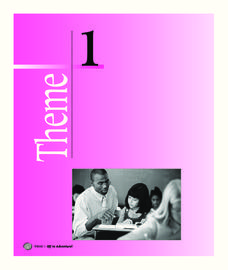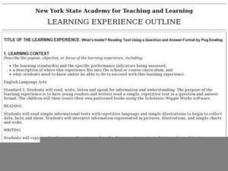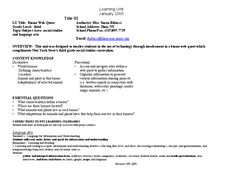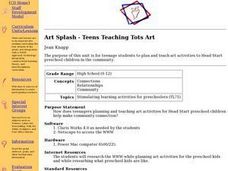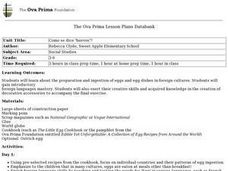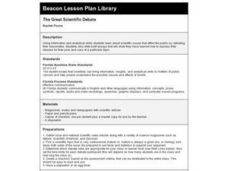Starfall
Xx is in Six
In this language arts worksheet, students learn to print both upper and lower case letter Xx. Students trace several examples before forming their own letters in the unlined boxes.
Curated OER
Dr. Seuss Reading Search
In this Dr. Seuss reading comprehension worksheet, students read a selection about the author before answering 6 questions based on the reading.
Curated OER
Our Unfinished Work
Students investigate the racism elements after the election of President Barack Obama. In this racism lesson, students read a recent article about 'post-racial' society. Students compile a list of achieving a post-racial society and...
Curated OER
Fashion Forward, Fashion Functional
Young scholars consider the implications of waste. In this waste streams lesson, students learn what waste streams are and identify their impact on the environment. Young scholars also recycle waste materials to create functional objects.
Curated OER
Creating an Instructional Manual
Ninth graders create an instructional manual about using a mechanical device. In this technical writing lesson, 9th graders create a PowerPoint presentation that includes the step by step process of how to use the mechanical device.
Curated OER
Infusing Equity by Gender into the Classroom
Students discover the biases between the two genders by comparing males and females in different species. In this gender identity lesson, students research National Geographic Magazine and view videos demonstrating the differences...
Curated OER
Connecticut Complicity
Eleventh graders take a closer look at slavery in Connecticut. In this slavery lesson, 11th graders research the contributions of Connecticut residents who spoke out about the issue of slavery. Students take on the personas of the...
Curated OER
The Dust Bowl
Eleventh graders develop an understanding of the Dust Bowl. In this 1930's America lesson plan, 11th graders respond to questions regarding the songs and literature about the era. The primary sources should be gathered by the instructor.
Curated OER
Recognizing Advertising Techniques
Students explore advertising techniques. In this media awareness lesson, students read articles about foods and their links to childhood obesity. Students also discuss propaganda techniques that advertisers use to sell certain foods.
Houghton Mifflin Harcourt
Off to Adventure!: Challenge Activities (Theme 1)
Off to Adventure! is the theme of an English language arts unit comprised of a variety of challenge activities. Scholars enhance skills and reinforce concepts by taking part in a grand book discussion, giving an oral report, and writing...
Curated OER
Making Headlines
Students consider their personal opinions about the news and politics, read about the public relations drive behind the 2004 presidential election, and gather information for a press release promoting either Mr. Bush or Mr. Kerry.
Curated OER
What's Inside? Reading Text Using a Question and Answer Format
Students use a variety of print media to copy words from. They listen for facts while the teacher reads to them. They listen to a book about eggs and write a book of their own.
Curated OER
Speaking of the Speaker
Students deconstruct an obituary and examine the elements and incidents of a person's life that were chosen to memorialize in an obituary. They research a notable American and write and obituary about their life.
Curated OER
Harry Potter and the Prisoner of Askaban Quiz
In this online quiz instructional activity, learners answer a set of multiple choice questions about Harry Potter and the Prisoner of Askaban. Page includes links to answers, ads and resources.
Curated OER
Biome Web Quest
Third graders create paper mache globes, paint them and label the oceans and the continents. In groups, they research a biome, write about it and create an artistic visual representation of the biome and present it to the class.
Curated OER
Cite Your Sites!
The New York Times article “Lessons in Internet Plagiarism,” launches a look at how the Internet has increased the prevalence of plagiarism. The richly detailed lesson includes warm-up and wrap-up activities, discussion questions,...
Curated OER
Media Coverage
Students research news coverage to examine how a local issue does not receive fair attention in the news. In this new coverage lesson, students discuss where they get their information and why some issues are ignored. Students research a...
Curated OER
Teens Teaching Tots Art
Pupils plan and teach art activities to Head Start preschool students in the community. Pupils research the WWW while planning art activities for the preschool kids and while researching what preschool kids are like.Students demonstrate...
Curated OER
Reviewing the Scientific Process
Pupils investigate the scientific method by reading science journals. In this scientific research lesson, students read several articles of the National Inquirer and analyze the specific parts of an article. Pupils complete worksheets...
Curated OER
Real Attractive
Sixth graders create a collage of attractive people. They write about what makes these people attractive. They discuss what makes someone attractive. They research eating disorders and how the media impacts what people deem as attractive.
Curated OER
Como se dice 'huevos'?
Students research about the preparation and ingestion of eggs and egg dishes in foreign cultures. Students gain introductory
foreign languages mastery. Students also exert their creative skills and acquired knowledge in the creation of...
Curated OER
What's Wild?
Third graders examine pictures of animals before deciding if it is a wild animal or a domesticated animal. They discuss the difference between the two types of animals, where they live, what they eat, and what they need to survive. Using...
Curated OER
Creating your Frog's Environment
Learners discuss where frogs can live. After the discussion, they create an environment for a frog using items of their choice. Some may include: construction paper, paint, magazines. The environment could even be 3-D. The key to this...
Curated OER
The Great Scientific Debate
Fourth graders examine scientific issues that affect the public by debating their classmates. They also write brief essays that show they have learned how to express their reasons for their pros and cons of a particular topic.











